Coordination
Contexte
Une coordination efficace peut éviter les risques de lacunes et de duplication dans les interventions humanitaires et optimiser l’impact des transferts monétaires pour les populations affectées par une crise, mais aussi aider à tirer le maximum de financements humanitaires limités. Cependant, le rapport « La situation mondiale des transferts monétaires » du réseau CaLP montre que la coordination des transferts monétaires est vue comme inefficace et variable, ce qui affecterait fortement les opérations.
95 bailleurs, ONG internationales et nationales, acteurs du secteur privé et une agence de l’ONU ont demandé plus d’informations sur deux problématiques clés concernant la coordination des transferts monétaires :
- qui doit être responsable de la coordination des transferts monétaires ;
- quelle doit être la portée de la responsabilité des groupes de travail sur les transferts monétaires, notamment concernant les transferts monétaires à usages multiples.
Priorités actuelles
Nous cherchons à contribuer à la résolution de cette problématique à trois niveaux : en aidant les groupes de travail sur les transferts monétaires au niveau régional ; en contribuant à trouver des solutions pratiques pour la coordination des transferts monétaires au niveau mondial ; et en organisant des discussions basées sur des données probantes sur les problématiques clés, en soulignant les points de discussion essentiels et les opportunités de progrès.
Contenu associé

Cash Coordination – LIVE timeline
Page
The latest updates on cash coordination as they unfold.

95 Organisations Sign Letter Calling for Strengthened Cash Coordination
News
Today a letter signed by 95 organisations was handed into the Emergency Relief Coordinator (ERC) urging the Inter-Agency Standing Committee (IASC) to take a decision on the leadership and scope of cash coordination in the coming year.

Is cash transforming the humanitarian system or is the system limiting how cash is used?
Blog Post
At the State of World’s Cash 2020 launch event, Sorcha O’Callaghan, Director of Humanitarian Policy Group at ODI warned that, “Cash offers a huge transformative potential, but as far as the system is privileging the interest of the agencies over people in crisis, we won’t be able to see it”. If you missed the State of the World's Cash 2020 launch we're sharing highlights. Quote 4...
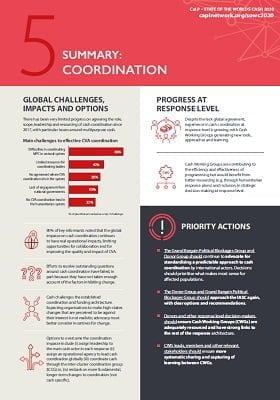
State of the World’s Cash 2020 Chapter 5 summary: Coordination
Report
There has been very limited progress on cash coordination since 2017. Cash continues to challenge the established coordination and funding architecture, and efforts to resolve outstanding questions around cash coordination have failed. Despite the lack of global agreement, Cash Working Groups are pushing forward and contributing to improved programming, and generating new approaches. This...

Fiche conseils sur la coordination des transferts monétaires
Guides et outils
Les Transferts Monétaires (TM) représentent une part croissante de la réponse humanitaire globale, avec un montant estimé à 4,7 milliards de dollars distribués dans le monde en 2018, contre 2,8 milliards de dollars en 2016. Dans ce contexte, une coordination efficace des TM est un élément de plus en plus essentiel pour garantir une réponse humanitaire de qualité. Le rapport « State...

Introducing the Cash Coordination Tip Sheet
Webinar
The CALP Network has developed a tipsheet setting out established best practice and key guidance and resources for all aspects of cash coordination, intended as a clear, accessible and action-oriented guide for those engaged in coordination of cash and voucher assistance at the field level.

Cash Coordination: A proposal from members in MENA
Blog Post
Earlier this year the CALP Network undertook regional consultations to explore options for cash coordination. This blog lays out recommendations from participants from the Middle East and North Africa who sketched out what cash coordination, and coordination more broadly, could look like in future to support a more effective, efficient and accountable response.
Thematic lead
Contenu récent
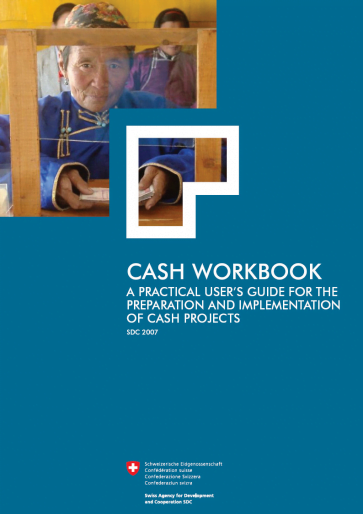
Cash Workbook: A Practical User’s Guide for the Preparation and Implementation of Cash Projects
Guidelines and Tools
This workbook is a tool that guides managers through the project cycle of managing a cash transfer programme including administrative and database setup, and project management systems and procedures.

External Evaluation Report on the Cash for Repair and Reconstruction Project Sri Lanka
Report
The Indian Ocean tsunami caused huge loss of life, displacement and destruction in Sri Lanka. People’s immediate priorities were to find shelter, safety, meet basic needs and trace and mourn loved ones. The population affected took shelter with relatives and friends, in temples, mosques and public...
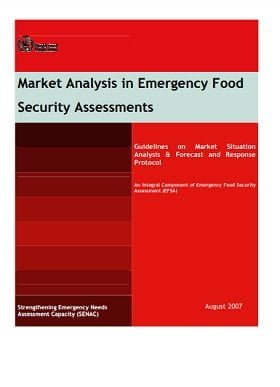
Market Analysis in Emergency Food Security Assessments
Guidelines and Tools
This document provides a generic overview of market analysis as an integral part of an emergency food security assessment. The main objective is to provide a basic understanding of markets, including how to gather market information, conduct a situation analysis, and
interpret the analysis to inform...

Cash Workbook – A Practical User’s Guide for the Preparation and Implementation of Cash Projects
Report
Since 1999, the Humanitarian Aid Department of the Swiss Agency for Development and Cooperation (SDC), a division of the Federal Department of Foreign Affairs, has implemented a series of Cash Transfer Projects in different humanitarian contexts. Cash grants provided to more than 100,000 people in need...
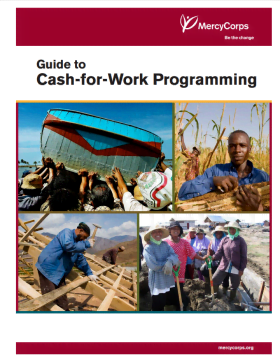
Guide to Cash-for-Work Programming
Guidelines and Tools
Cash-for-Work is a short-term intervention used by humanitarian assistance organizations to provide temporary employment in public projects (such as repairing roads, clearing debris or re-building infrastructure) to the most vulnerable segments of a population. The methodology is relatively new, but its...

Market Analysis Tools in Rapid-Onset Emergencies: Phase one report
Report
This report was commissioned by Oxfam’s Emergency Food Security and Livelihood (EFSL) team as part of a larger exercise to develop a market analysis toolkit for rapid-onset emergency situations. The impetus for this arose from the recognition by Oxfam, other humanitarian agencies and donors that the...

The Use of Cash/Vouchers in Response to Vulnerability and Food Insecurity: Case study review and analysis
Report
This document summarizes the major characteristics and outcomes of 27 recent pilots, projects or programs worldwide that made use of cash and/or vouchers to provide benefits to people in need. The concluding section attempts to synthesize the commonalities and contrasts among those cases, as a first step...
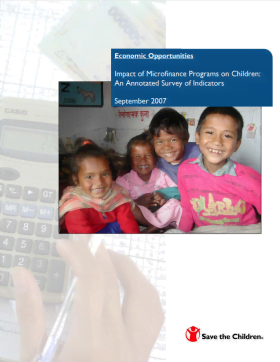
Impact of Microfinance Programs on Children: An annotated survey of indicators
Report
The purpose of this study is to ascertain what indicators have been used by multisectoral, child-focused non-governmental organizations (NGOs), microfinance practitioners and social performance researchers to assess processes that address children’s concerns in operations and the impact of microfinance...
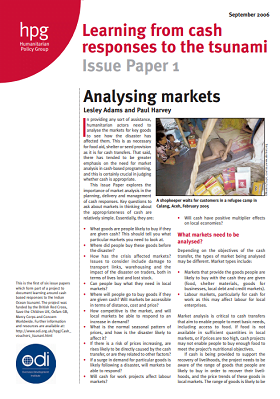
Learning from cash responses to the tsunami: Issue Paper 1: Analysing markets
Report
This is the first of six issue papers which form part of a project to document learning around cash-based responses to the Indian Ocean tsunami. The project was funded by the British Red Cross, Save the Children UK, Oxfam GB, Mercy Corps and Concern Worldwide. This 5-page Issue Paper explores the broad...
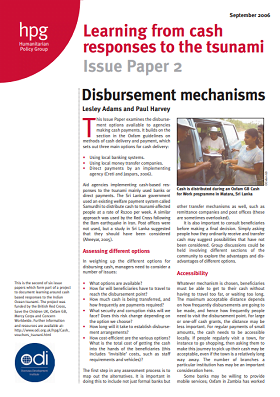
Learning from cash responses to the tsunami: Issue Paper 2: Disbursement mechanisms
Report
This is the second of six issue papers which form part of a project to document learning around cash-based responses to the Indian Ocean tsunami. The project was funded by the British Red Cross, Save the Children UK, Oxfam GB, Mercy Corps and Concern Worldwide. This 5-page Issue Paper examines the...
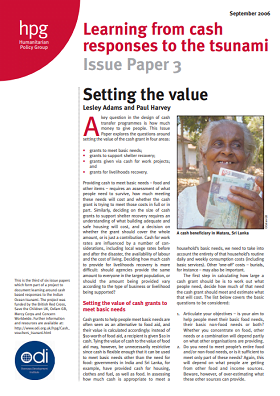
Learning from cash responses to the tsunami: Issue paper 3: Setting the value
Report
This is the third of six issue papers which form part of a project to document learning around cash-based responses to the Indian Ocean tsunami. The project was funded by the British Red Cross, Save the Children UK, Oxfam GB, Mercy Corps and Concern Worldwide. A key question in the design of cash transfer...

Learning from cash responses to the tsunami: Issue Paper 4: Cash and shelter
Report
This is the fourth of six issue papers which form part of a project to document learning around cash-based responses to the Indian Ocean tsunami. The project was funded by the British Red Cross, Save the Children UK, Oxfam GB, Mercy Corps and Concern Worldwide. This Issue Paper highlights some of the key...
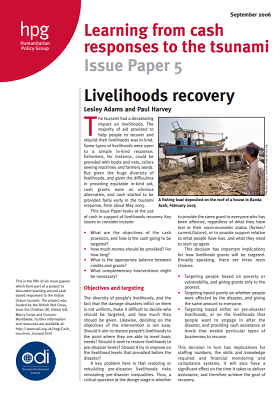
Learning from cash responses to the tsunami: Issue Paper 5: Livelihoods recovery
Report
This is the fifth of six issue papers which form part of a project to document learning around cash-based responses to the Indian Ocean tsunami. The project was funded by the British Red Cross, Save the Children UK, Oxfam GB, Mercy Corps and Concern Worldwide. This Issue Paper looks at the use of cash in...

Independent Evaluation of Oxfam GB Malawi’s Emergency Cash – Transfer Programme
Case Study
Poor rainfall in Malawi in the 2004/2005 growing season resulted in significantly reduced cereal and non-cereal food production in the country, leaving up to 4 million people in need of assistance. In response, Oxfam planned a programme in southern Malawi, which included a ‘pilot’ cash-transfer...

Hurricanes Katrina and Rita Disaster Relief
Report
Hurricanes Katrina and Rita destroyed homes and displaced millions of individuals. In the wake of these natural disasters, the Federal Emergency Management Agency (FEMA) responded to the need to provide aid quickly through the Individuals and Households Program (IHP), which provides housing assistance,...
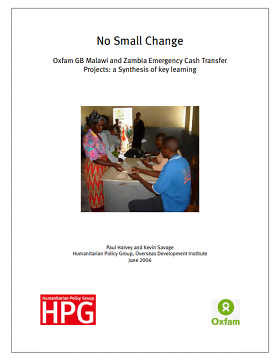
No small change: Oxfam GB Malawi and Zambia emergency cash transfer projects: A synthesis of key learning
Case Study
This learning document uses Oxfam GB’s experience of emergency cash transfer programming in Malawi and Zambia to draw out some important lessons in using cash. It examines the two programmes and the findings of the evaluations and asks the question, “Is cash more cost-effective than food aid?”...

Market-Based Food Assistance Pilot Project Pidie and Lhokseumawe Districts, Banda Aceh: Report of Final Evaluation
Report
This report represents the findings of a final evaluation undertaken for Save the Children Indonesia/Banda Aceh of its Market-based Food Assistance (MBFA) Pilot Project carried out in Pidie and Lhokseumawe districts in early 2006. For 3 months, from February-April 2006, SC/BA implemented a pilot project,...
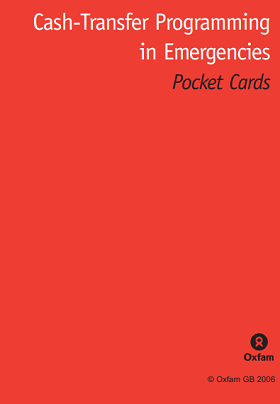
Cash-transfer programming in emergencies – Pocket cards
Report
In emergencies, distributing cash can often meet people’s immediate needs more quickly and appropriately than the direct distribution of commodities. Cash gives people choices and thereby preserves their dignity. These 15 cards contain key elements from the book, which draws on Oxfam’s experience to...

Transferts d’argent: Programmation pour les situations d’urgences
Guides et outils
Un guide compact et concis visant à soutenir les gestionnaires de programmes afin d’évaluer si le cash est la réponse la plus appropriée en cas d’urgence et de choisir entre différents types d’interventions monétaires. Ce guide est basé sur l’expérience d’Oxfam GB sur cinq ans...

Mapping the Risks of Corruption in Humanitarian Action
Report
The issue of corruption in emergency relief and rehabilitation is a key concern for practitioners, who invest considerable resources and energy in trying to minimise it. However, it has barely been discussed in policy terms, and little researched. This paper aims to map the risks of corruption in the...



